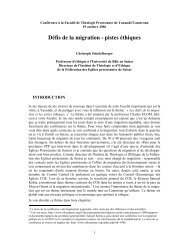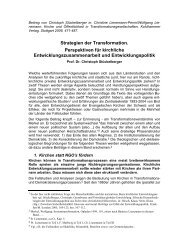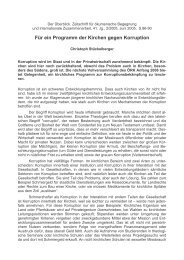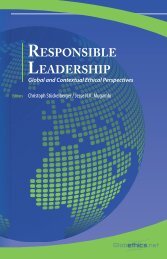BREAK THE CHAINS OF OPPRESION AND THE YOKE OF ...
BREAK THE CHAINS OF OPPRESION AND THE YOKE OF ...
BREAK THE CHAINS OF OPPRESION AND THE YOKE OF ...
You also want an ePaper? Increase the reach of your titles
YUMPU automatically turns print PDFs into web optimized ePapers that Google loves.
EMpire thors also supply an ambitious vision of a democratic global society—one which<br />
is certainly not uncontroversial but shows that “another world is possible” 4 .<br />
Political scientist Herfried Münkler comes up with a rather smug analysis: “Being<br />
empire is not all fun.” 5<br />
Empires are not, “figures from sentimental literature and cinematic reminiscences”.<br />
Empires exist and, according to Münkler, they are undergoing a “transformation<br />
of imperial order”.<br />
Münkler says that, in the 20th century, new forms of imperial systemization appeared<br />
which are no longer confined to territorial presence and militarization.<br />
Elements like economic integration, control of technological innovations and<br />
business law take on a central role; they already played a part at the time of the<br />
Roman Empire but they have a new significance today.<br />
Other questions are standard elements of imperial policy – the resource question,<br />
economic policy, legal codes.<br />
By contrast, the empires of today do not always have an easy time at another<br />
point; they have to contend with the media of the entire world public – at least<br />
when they do not go so far as to switch off the Internet, as China has done. This<br />
creates public awareness, which sets clear limits on imperial tendencies, e.g.<br />
when it costs too many victims to be empire or the price is too high. Or when<br />
many people note that many other people are likewise victims.<br />
The most important insights include the fact that - with the decline of colonial<br />
imperialism and under the conditions of globalization - present-day empires differ<br />
completely from those of the past. New empires distinguish themselves<br />
through a heterogeneous power policy. In more recent times, that has meant not<br />
necessarily pursing a classical policy of aggressive conquest: troops march in,<br />
land is conquered. �Whether � a power � is an empire �is not �shown<br />
by the conquered<br />
square kilometers, but by how the power succeeds in using its power, how power<br />
is secured and with whom. Nor is an empire “America”, “the EU”, country X,<br />
but, as the Accra Confession aptly describes, a “coming together”. The power of<br />
empire is shown not just through the visible presence of imperial storm troops,<br />
4 Ibid. 9: „Stark vereinfacht könnte man sagen, dass die Globalisierung zwei Gesichter<br />
aufweist. Auf der einen Seite umspannt das Empire mit seinen Netzwerken von Hierarchien<br />
und Spaltungen den Globus; (…) Andererseits bedeutet Globalisierung aber<br />
auch, dass neue Verbindungen des Zusammenwirkens und der Zusammenarbeit entstehen,<br />
die sich über Länder und Kontinente hinweg erstrecken und auf zahllosen Interaktionen<br />
fußen. Dieses zweite Gesicht der Globalisierung bedeutet nicht die weltweite<br />
Angleichung einer und eines jeden; es bietet uns vielmehr die Möglichkeit, unsere Besonderheit<br />
zu wahren und das Gemeinsame zu entdecken, das es uns erlaubt, miteinander<br />
zu kommunizieren und gemeinsam zu handeln.“<br />
5 Münkler, Herfried: Imperien, Die Logik der Weltherrschaft – vom Alten Rom bis zu<br />
den Vereinigten Staaten, Hamburg 2008, 184ff.<br />
������������������������������������������<br />
� � � � � � �����������������<br />
�<br />
– Empire - Provocation with a Perspective – 71










